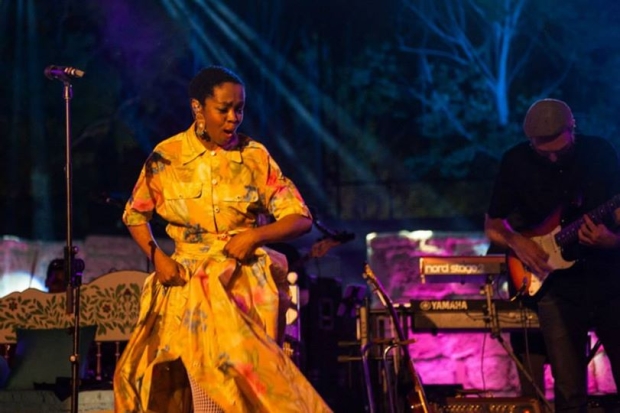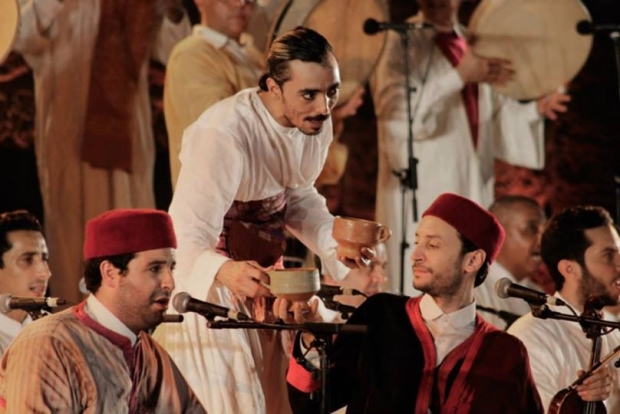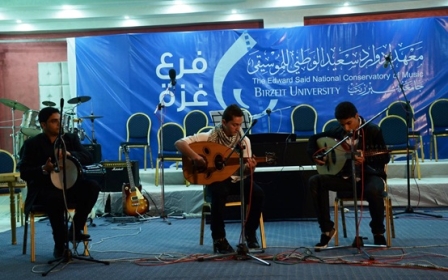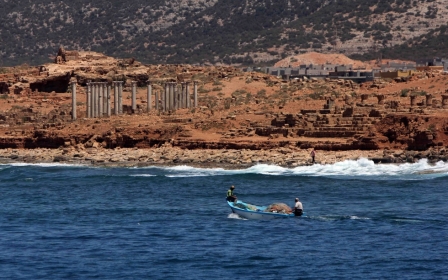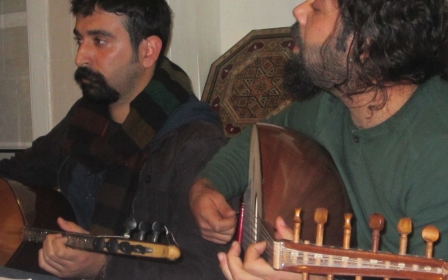Music festival reignites passion among Tunisians
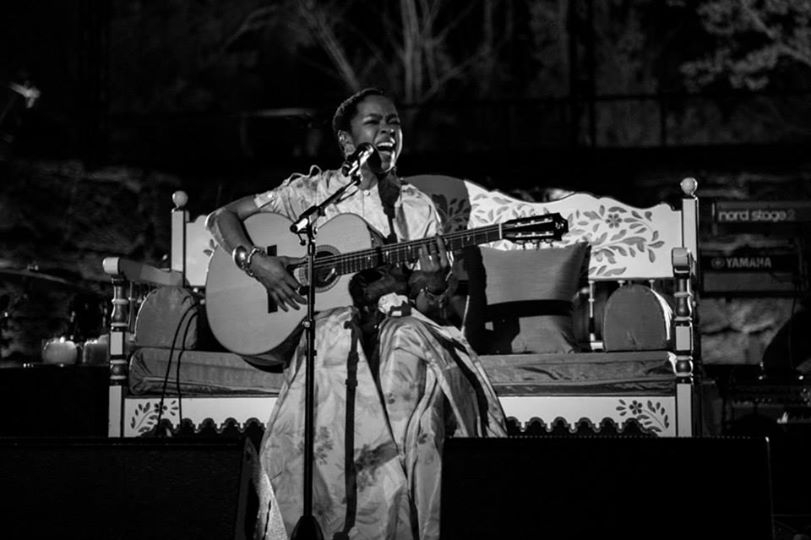
On Friday, 7 August, Gnawa Diffusion entered the stage of the Roman amphitheatre in the beach town of Hammamet, Tunisia, amidst yells of adoration. Security officials were omnipresent in the arena.
After performing for a half hour, Amazigh Katib, the lead singer of Gnawa Diffusion, put down his gimbri (a traditional Gnawa instrument, similar in size to a guitar), approached the security guards standing between him and the audience and convinced them to stand down, which garnered a roar of appreciation from the crowd.
As Amazigh walked back to his microphone, he put his hand to his heart in a sign of appreciation to the men for complying. His gesture represented a sign of solidarity with the people of Tunisia. He connected with them by removing the security barrier and also by putting his hand over the red side of his shirt embossed with a picture of the African continent as a flag.
The Tunisian flag itself is red and for Tunisians, the colour represents the blood of the martyrs in the fights for both independence from France and the revolution against the Ben Ali regime. In that moment of solidarity, Amazigh illustrated the profoundly transformative power of music.
Just like that exhilarating night in the amphitheatre, the Tunisian summer concert series as a whole has been a resounding success. In its 51st year, the International Carthage Music Festival, taking place in Roman amphitheatres in both Hammamet and Carthage, has hosted diverse musical acts, including some hugely well-known bands and artists.
Tunisia’s fans of reggae and Rasta culture found themselves right at home during the Gnawa Diffusion concert. The band’s members are French Algerians, who after growing up for much of their lives in France, tried to rediscover their Algerian identity. Today, they combine elements of Gnawa, a rhythmic, North African style of music, with reggae, rock, French, Arab and Berber influences. The lead singer’s name, Amazigh Katib, fittingly means "The Free Writer".
Even while surrounded by security forces, various members of the Gnawa Diffusion audience joined young Rasta Tunisians chanting in Arabic, “The people want drugs legalised!” This chant is a direct protest against the harsh drug laws in Tunisia, but also an indirect one against potentially power-centralising measures being adopted by the current government.
Crowd finds its voice
Many of these youths would have been too intimidated to chant such a slogan in other venues, since there is a very real risk of arrest and imprisonment. However, within the context of a musical concert, these same young adults transformed into passionate activists.
Tunisia’s reggae aficionados also flocked to see Jimmy Cliff, another hero of the Jamaican music. Jimmy Cliff had actually performed at the 1996 Carthage Festival, and made his triumphant return to a packed house at the Hammamet amphitheatre, preaching his lyrical message of universality and peace.
As much as the audiences loved Cliff and Gnawa Diffusion, the music festivals were not without their challenges. In addition to the need for increased security since the Bardo Museum and Sousse beach attacks, the concert series in Carthage also hit a bump with famous American R&B artist, Lauryn Hill’s performance night. Scheduled to start at 10pm local time, Hill kept the crowd waiting until 11:45pm. In the 1 hour and 45 minutes in between these times, the crowd got restless, switching between boos and cheers in anticipation of the long-delayed performance.
Once on stage, the crowd unleashed a mix of jeers and praise, with a sprinkling of chants of “Degage”, French for “leave”, which Tunisians turned into a famous slogan during the 2011 revolution against the Ben Ali regime. While plucking strings to test her guitar, Lauryn Hill announced, “Tunisia, we are here!” which did little to acquiesce the crowd’s anger. Finally, she shushed the crowd loudly in her mic.
The strong performance which followed did little to erase the bitter tastes in the mouths of Tunisians after being forced to wait for almost two hours.
Mohamed Zarrami, an orthopedic surgeon and avid fan of music festivals, in Tunisia was largely disappointed and believes that “she wouldn’t have done this if she was in France or Germany. She lacks respect for Tunisians”. The Carthage Festival itself denied responsibility and also blamed Hill. Rumours circulated that Hill’s equipment got misdirected in Italy to another country, but these are unconfirmed.
Although this seems like a negative experience for Tunisians, one could also view it positively, since a musical venue again transformed them into passionate people, not afraid of criticising those who disrespect them.
Premier Essid joins in show
Soon after the Lauryn Hill concert, the festival got back on track with an outstanding night of Hadhra music and performance. After an ornate display of fireworks and the entrance of Tunisia’s Prime Minister Habib Essid in traditional clothes, the Hadhra performers took the stage. Hadhra is a distinctly Tunisian and Sufi genre of music, which features approximately 50 performers, ranging from dancers, percussionists, singers and flautists, among others.
All garbed in traditional Tunisian clothes, with men wearing red chechiya hats and women wearing white robes reminiscent of Roman togas, the Hadhra performers led the audience into a communal trance.
Crowd members danced by rocking their heads back and forth. Many of them entered into states of profound euphoria and connected with each other and the performers in deeply spiritual ways.
Hadhra itself is not without controversy, as some more conservative Tunisians believe the music is problematic. They see it as worship of humans - the performers - on pedestals close to that of Allah. One taxi driver, the morning before the concert, said in Arabic, “It is actually haram. There is only one God and they are committing polytheism.”
Religious reaction
Although his comments might seem exaggerated, his beliefs are in line with a small, but growing group of Tunisians who are adopting tougher approaches to elements of culture and music which they deem to be against their religious ideas.
Even in light of these issues, the concert series has been largely successful and transformative. As can be seen with the chants of “degage” and “the people want drugs legalised,” the music festivals appeared to have reinvigorated the revolutionary juices in the hearts of Tunisians. The concerts have created a great buzz in the country.
Marouane Galoussi, a 25-year-old Tunisian man who studied in Algeria, said after the Gnawa Diffusion concert, “We don’t have enough culture. These concerts are great, but we need similar ones all year. Tunisia has so much potential in terms of music and festivals.”
Galoussi has a point. Tunisia’s culture and ethnic makeup is a mosaic as complex as some of the mosaics found in the famous Bardo Museum. In Tunisia, East meets West, Africa meets Europe, Islam meets Judaism, and Arab meets Berber.
One could easily look at these different elements coming together and see them as potential points of contention. However, illustrated by the success of the festivals, one could also look at these same different elements and see a country with vast potential for a transformative music scene.
Middle East Eye propose une couverture et une analyse indépendantes et incomparables du Moyen-Orient, de l’Afrique du Nord et d’autres régions du monde. Pour en savoir plus sur la reprise de ce contenu et les frais qui s’appliquent, veuillez remplir ce formulaire [en anglais]. Pour en savoir plus sur MEE, cliquez ici [en anglais].



